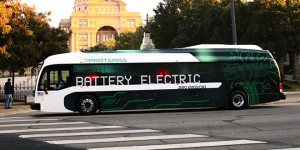 Maybe some hard-core transit boosters don’t like electric passenger vehicles, but they should sure like battery electric buses. These EV buses cost less over time and don’t spew pollution when they accelerate.
Maybe some hard-core transit boosters don’t like electric passenger vehicles, but they should sure like battery electric buses. These EV buses cost less over time and don’t spew pollution when they accelerate.
Charged EV magazine interviewed two leaders of the industry, Proterra’s Ryan Popple and ABB’s Daan Nap. I’ve worked a bit with Ryan Popple in the past and am impressed with his understanding of the technology and ambitions for the future. I recommend reading his interview in full. Here’s a key snippet:
I also predict that, for a lot of these huge orders you see for 500 or 800 diesel buses that include long-term options to buy more, those options are not going to get exercised. They’ll probably ship the first third of that order, and then the transit authority board, the city’s mayor, or even the transit staff are going to insist that they don’t exercise the remainder of the options of the contract. This is because the backlash against fossil fuel is really building from an economic perspective. As you run the numbers on how much money they’re going to waste by deploying 500 diesel hybrids instead of EVs, you’re going to have taxpayer watchdogs start to come out of the woodwork and say, “This is crazy!” The reason it’s still happening is because EV tech is still relatively young and we have to prove it out. So we’re currently proving that we’re not equal to diesel, we’re better.
There will also be environmental and social justice pressures. How do you deploy 25 zero-emission buses in one part of the city, and then continue to emit diesel fumes on all the other bus routes? There is a fairness aspect to that. I think that, in time, the neighborhood that is next to the one with EVs will ask, “When are you going to stop making me breathe diesel exhaust? If it’s cheaper to run EVs in the city, when are we going to get them in my neighborhood?”
That’s why we’re starting to see those roadmaps to go all-electric from transit agencies. They want to communicate the plan to the communities that are asking these questions.
He also talks about the need to make EV bus charging standardized and competitive, as opposed to Tesla’s approach of vertically integrating the charging by owning it and making it incompatible with other vehicles. Of course, it’s different for Tesla when their market is largely private consumers. ProTerra, on the other hand, has to please municipal transit managers who don’t want to be held captive to one particular company with a closed-source charging technology.
The bottom line: as transit agencies get more experience operating these buses, and as prices continue to fall while manufacturing increases, the diesel exhaust-spewing bus will quickly become a thing of the past. That’s a development that both the pro-transit and pro-EV communities will both celebrate.
Leave a Reply
You must be logged in to post a comment.


